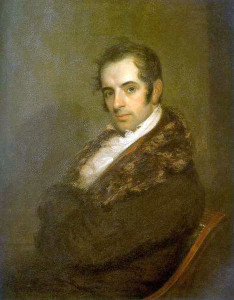Historians need to stop thinking about the tenure track as the only way and as the only measure of success within the profession. The profession would instantly help improve the job market for historians by improving its ability to help students at all levels of historical training recognize and discuss their unique and valuable skill set outside of the academy. It also needs to stop treating employment within the tenure track as the only “true” job market for historians and as the only measure of success.
Getting to the Malleable PhD
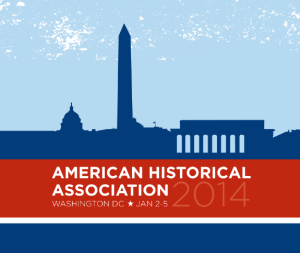 In January 2014, I participated on the “Getting to the Malleable PhD” panel at the annual meeting of the American Association Historical Association.
Jacqueline Jones organized the panel, which consisted of myself, Walter M. Licht (University of Pennsylvania), Ramona Houston (Scholar and Consultant), and R. Darrell Meadows (Kentucky Historical Society).
In January 2014, I participated on the “Getting to the Malleable PhD” panel at the annual meeting of the American Association Historical Association.
Jacqueline Jones organized the panel, which consisted of myself, Walter M. Licht (University of Pennsylvania), Ramona Houston (Scholar and Consultant), and R. Darrell Meadows (Kentucky Historical Society).
Each panelist offered a personal narrative.
Some offered policy proposals and critiques about graduate eduction.
I tried to keep my presentation practical.
Recap of My Presentation
I began my talk by offering a couple of confessions:
First, I am still in the process of making my PhD malleable. I do not have any concrete answers for how to make a living as an independent historian, yet.
Second, I have the luxury of being able to take my time and figure out what career path will work best for me because I have spousal support.
My partner Tim has a great job; he works for Google. He is incredibly supportive and has the patience of a saint. Tim helped me through graduate school and now he is content to let me explore how I can create a career as an independent historian. I do not know how I got so lucky in life, but I am grateful for it.
Next, I discussed how I work as an historian and writer and dabble in entrepreneurship.
Finally, I talked about what I wish I had known at the beginning of my transition out of academia.
 3 Things I Wish I Had Known When I Started to Leave Academia
3 Things I Wish I Had Known When I Started to Leave Academia
1. Nearly every person who leaves academia experiences a similar period of transition
Step 1. Depression and Mourning
Even if you don't want a traditional tenure-track job, most people who leave the academy experience a feeling of loss over their unrealized dream of living the “academic life.”
Step 2: Acceptance and Hope
You emerge from your gloomy phase into one of acceptance.
You recognize the fact that you were not meant to be a "traditional academic" and you have hope that you will be able to follow your passion in a fulfilling way.
Step 3: Exploration
Most of the time you know deep-down what it is you want to do, but few of us will admit it right away, which means many of us will explore different career options.
I explored a lot last year and I am still exploring. Last year, I interned with 2 public history groups and found that I did not want to run a non-profit.
Step 4: Action
You admit what you want to do and take steps to pursue your calling.
Deep-down I knew that I wanted to make a career as a public historian, someone who makes history accessible for everyone through my writing and speaking.
This year, I am experimenting with how I can earn a living from my writing and speaking.
2. Twitter is a great resource for people who want to transition out of the academy
I am still in awe of the generosity of the #postacs, #altacs, and #twitterstorians on Twitter.
Nearly everyone in these communities has a helpful story or advice that they are willing to share with you.
All you need to do is ask.
3. You HAVE transferrable skills
Graduate school was a valuable experience that taught us skills that “real-world” companies and organizations value.
A list of just a few of our marketable skills • Analytical Thinking • Ability to Write • Ability to Synthesize LARGE amounts of information into digestible nuggets • Computer Skills • Research • Project Management • Entrepreneurialism
Conclusion
The above outline represents the information you will find during my segment of the panel, which begins at about 23 minutes 20 seconds.
You will find a lot of value in this video if you are thinking about, or in the process of, leaving academia or if you are a professor thinking about ways you can improve your graduate education program.
You will find that some of the most valuable insights come during the Question & Answer session at the end of the panel.
Please feel free to tweet me, send me an e-mail, or leave a comment if you have questions about how you can embrace your post-academic or alternative-academic life.
5 Tips That Will Help You Stay Current With Scholarship
 Do you struggle to keep up-to-date with new historical research?
Anyone who writes about history knows that it can be a challenge to keep up with the latest scholarship.
Do you struggle to keep up-to-date with new historical research?
Anyone who writes about history knows that it can be a challenge to keep up with the latest scholarship.
In this post you will learn about the 5 methods I use to stay current on historical scholarship.
Method 1: Academic Journals
Journals will help you stay current on the latest scholarship.
They provide a wealth of information even if you lack the time to read every article (most historians do).
Open a journal, read its table of contents, and read/skim the articles and book reviews that interest you and/or apply to your research. This technique will help you stay informed.
Here is a list of the academic journals I read/skim.
 General History
American Historical Review
General History
American Historical Review
Early American History
The William and Mary Quarterly
Journal of Early American History
History of New York
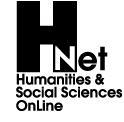 Method 2: H-Net
Method 2: H-Net
H-Net “creates and coordinates Internet networks with the common objective of advancing teaching and research in the arts, humanities, and social sciences.”
Through H-Net you can subscribe to over 100 different e-mail lists that focus on different aspects of history. H-Net lists are a great way to learn about history-related jobs, conferences, fellowships, and research. They also provide access to a global network of historians. Historians use H-Net to pose, answer, and discuss questions about scholarship, sources, and interpretation.
H-Net is in the process of transferring to a new, more versatile platform called H-Net Commons. If you can’t find a list for your topic of study on H-Net be sure to check out H-Net Commons.
.
 Method 3: Blogs
Method 3: Blogs
Blogs about history will also keep you abreast of scholarship. Some blogs read like newspapers about history and scholarship, others discuss the minutiae of research.
I subscribe to a number of blogs, which I check each morning.
History Organizations
AHA Today by the American Historical Association
History @ Work by the National Council on Public History
History Publications
The Journal of the American Revolution
Archives, Libraries, & Museums
The Past is Present the American Antiquarian Society Blog
The Beehive: The Official Blog of the Massachusetts Historical Society
Historian Blogs (I subscribe to over 35 blogs written by historians. This list comprises the most active blogs. I have listed them in alphabetical order by historian/blogger.)
Boston1775 by J.L. Bell
Jacksonian America: Society, Personality, and Politics by Mark R. Cheathem
The Last Campaign: Legislative Branch, Presidential Legacy, and Related Matters by Anthony J. Clark
The Way of Improvement Leads Home by John Fea
In the Words of Women, a group blog kept by independent historians who study women’s history
Keith Harris History by Keith Harris
The Junto Blog: A Group Blog on Early American History
Historiann: History and Sexual Politics, 1492-Present by Ann M. Little
American Studier by Ben Railton
That Devil History by Jared Ruminski
To Breathe Your Free Air by John D. Wilsey
 Method 4: Twitter
Method 4: Twitter
Many historians tweet information about their work as well as links to articles about new scholarship.
Method 5: Conferences
Try to attend at least one history conference each year.
Even if you can't make it to a conference, peruse the conference program. Conference programs contain paper titles, which will provide you with a good idea about the different research projects historians are working on.
What Do You Suggest?
How do you keep up with the the latest historical scholarship?
Which history blogs do you read?
Leave a comment, send me an e-mail, or tweet me.
Writing American History Outside of the Academy
 Have you ever wondered what it takes to write a great history book for a popular audience?
Have you ever wondered what it takes to write a great history book for a popular audience?
This year’s American Historical Association conference hosted several panels about writing history. I attended 3: “Historians, Journalists, and the Challenges of Getting It Right: The Art and Craft of the Obituary,” “Writing History for the Public,” and “Writing American History Outside the Academy.”
All of these panels contained helpful information, tips, and suggestions for historians who want to write for a general audience.
Today, I offer a recap of “Writing American History Outside of the Academy,” which provided advice on how historians can make their writing more enjoyable for a non-academic audience.
You can find my summaries of “The Art of the Obituary” and “Writing History for the Public” on John Fea’s blog “The Way of Improvement Leads Home.”
Biggest Takeaways: Historians need to learn the conventions of nuance and complex storytelling from novelists. As humanists, historians have a duty to portray the complexity of human life. Historians need decent writer websites.
Panel Summary
“Writing American History Outside of the Academy,” explored “the act of writing and how history gets done.” Unfortunately, bad weather limited the 5-person panel to chair Joseph Kip Kosek, Adam Goodheart, and Louisa Thomas; Megan Marshall e-mailed her comments, which Thomas read.
An historian, essayist, and journalist, Adam Goodheart writes for National Geographic, Outside, Smithsonian, The Atlantic, and The New York Times Magazine. He also wrote [amazon_link id="1400032199" target="_blank" container="" container_class="" ]1861: The Civil War Awakening[/amazon_link], “a gripping and original account of how the Civil War began.”
 Goodheart believes that historians should simplify their analysis, but embrace complexity in their storytelling when they write for a general audience.
Goodheart believes that historians should simplify their analysis, but embrace complexity in their storytelling when they write for a general audience.
Goodheart urged historians to read and study works of fiction. Novels often feel more life-like than history books because they present nuance and complexity. Historians could produce more life-like histories if they used these novelistic conventions.
Goodheart drove his point home with a quote from author Philip Roth: “As an artist the nuance is your task. Your task is not to simplify. Even should you choose to write in the simplest way, a la Hemingway, the task remains to impart the nuance, to elucidate the complication, to imply the contradiction. Not to erase the contradiction, not to deny the contradiction, but to see where, within the contradiction, lies the tormented human being.”
According to Goodheart, there is no reason a 300-page history book cannot show nuance and contradiction. Historians are humanists and humanists have a mission to show the world the complexities of human beings.
Finally, Goodheart asked the audience to be concise and not to get hung up on “simplification.” Historians already simplify; the historian’s focus on argument represents a form of simplification. Additionally, historians simplify history again when they choose which facts to leave out of their monographs.
Stranded in Boston by the“Blizzard of January 2014,” Megan Marshall e-mailed comments for the audience. Louisa Thomas read them.
Marshall believes that anyone can write history and her experience proves her point. Marshall is not a trained historian, but she has written 2 historical works, both biographies and the first, [amazon_link id="0618711694" target="_blank" container="" container_class="" ]The Peabody Sisters[/amazon_link], won several awards, including the 2005 Francis Parkman Prize for the best-written work of American history.
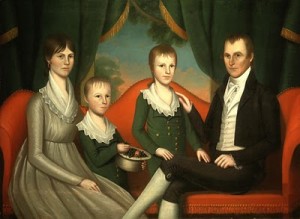 Marshall also questioned the historian’s reliance on argument, which she feels limits them when they write. Instead of focusing on argument, Marshall wants historians to write more about the people, places, and times they admire. She would also like historians to write more biographies because the narrative art of the genre would teach historians how to write exciting, well-written history books.
Marshall also questioned the historian’s reliance on argument, which she feels limits them when they write. Instead of focusing on argument, Marshall wants historians to write more about the people, places, and times they admire. She would also like historians to write more biographies because the narrative art of the genre would teach historians how to write exciting, well-written history books.
Like Marshall, Louisa Thomas is not a trained historian. After completing her B.A. in English at Harvard, she worked as a fact checker for The New Yorker. Thomas credits this work with giving her the experience she needed to research and write her book, [amazon_link id="B007HW6AOE" target="_blank" container="" container_class="" ]Conscience: Two Soldiers, Two Pacifists, One Family—A Test of Will and Faith in World War I[/amazon_link].
Thomas reiterated the need for historians to study fiction. Historians need to give readers a reason to turn the page, something many fiction writers do well.
Thomas stated that good history starts with the impulse to be close to people of another time. Like historians, readers also want to get to know the people of the past. Historians need to understand and talk about human beings as they are—emotional, conflicted, and contradictory creatures—if they want to reach a large audience.
Audience Q & A
Questions from the audience encouraged Goodheart and Thomas to provide more practical information about publishing and how to write for a general audience.
The Q&A discussion fell into 3 categories: Writing, Publishing, and Marketing
Writing
• Historians need to write more about people than about their arguments. Historians can make arguments through their narratives without having to focus on a thesis statement.
• Footnotes: Thomas commented that academic historians use footnotes to highlight their sources. Trade authors use them as a place to present the historiography for those who wish to consult it.
• Goodheart suggested that historians approach writing as if they were foreign correspondents in a foreign past. This approach will help historians write for their readers and help them describe the “obvious” information that isn’t obvious to most readers.
Publishing
Should you publish with an academic or popular press?
• Thomas: If you are looking for an academic job, go with an academic press.
• Goodheart: Be strategic and go with the press that caters to the audience you wish to reach.
• Wendy Strothman (Literary Agent): If you are looking for a tenure-track job publish with a good university press. University presses are more forgiving when book sales are low; bad sales figures will haunt you when you publish with popular presses.
• Strothman advised the audience to make sure they keep the option to their film rights.
Marketing/Writer Platform
Looking for a Literary Agent?
- Strothman: Agents will Google search you so create or update your writer website. Your website should contain PDFs and links to your articles as agents want to see your sources and expertise.
Tips and Tricks for Marketing Your Book
- Be ready the moment your book comes out. Most live or die in the first few weeks after publication.
- Call in every favor and connection you have to get word out about your new book.
- Never say “No” to promotion. Go to the small bookstores and sell 15 copies.
- Consider investing in promoted Facebook posts or sponsored tweets.
- Be prepared to be depressed by book sales. Even if others review your work, you might not be happy with your sales numbers.
- Strothman: Tell agents how you will help them market your book, do not tell them about the market for your book. Also, you need a decent website.
 What Do You Think?
What Do You Think?
What do you think about the advice these authors offered?
Do you have tips, tricks, or stories to add?
Take my reader survey so I can better serve you with my content.
First Step to Publishing: Network to Build Relationships, Guest Post by John Wilsey
John Wilsey teaches history and philosophy at Southwestern Baptist Theological Seminary. He is the author of [amazon_link id="1608997928" target="_blank" container="" container_class="" ]One Nation Under God: An Evangelical Critique of Christian America[/amazon_link] and blogs at johndwilsey.com.
 “How can I get my ideas published in book form?”
“How can I get my ideas published in book form?”
This burning question can sometimes animate a young scholar’s mind, body, and soul for months, sometimes years.
For most new Ph.D.s, the dissertation represents the deepest and widest river of writing and scholarship they have ever crossed.
Therefore, the question of how a new Ph.D. can get their dissertation published is not only natural, it is expected.
In my experience, personal and professional connections go a long way toward getting your revised dissertation published.
Questions to Ask Before You Network
Just as significant to these connections are the questions that young scholars should ask themselves:
- Whom do I know?
- Do people respect my work?
- Do others like me on a personal level?
- Am I willing to ask my connections for help?
- How willing am I to market myself to people who do not know me?
- Am I willing to adapt my work, within sensible limits, to see it published?
Think first about the obvious question—to whom are you willing to entrust your intellectual baby?
A university press might be the natural choice for your work.
Perhaps a trade press is the best fit.
Only you can decide whom you are willing to entrust with your intellectual property and regardless of the choice you make, it will be important for you to establish a personal connection with potential publishers.
 How Do I Establish Personal Connections?
How Do I Establish Personal Connections?
Attend academic conferences and present conference papers.
If you are not in the practice of at least attending one conference in your field, I have simple advice: Start.
Meet Scholars
Conferences are the best way to meet fellow scholars who work in your field.
You need to build relationships with your colleagues, even those with whom you disagree.
Presenting a conference paper allows you to formally introduce yourself and your research to other scholars.
Meet Publishers
Use the conference website or program to find out which publishers will be present at the book tables.
Look upon most these presses as potential publishers of your work.
Don’t Discount Small Publishers
Don’t be proud or closed-minded. Many small imprints are growing in size and sophistication.
For some, small imprints may be your only option.
Many scholars dismiss small imprints usually because they think their work is too good for them.
Remember: pride goeth before destruction—and obscurity.
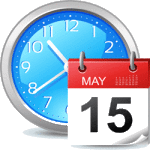 Make Appointments with Acquisitions Editors
Make Appointments with Acquisitions Editors
Make appointments with acquisitions editors two weeks or so ahead of the conference.
Search for the names and e-mail addresses of editors on press websites.
If possible, e-mail editors directly.
Request an appointment in a concise letter that explains your thesis in one sentence.
You might also attach your book proposal and a copy of your CV so the editor can see what you are offering.
You might have to send a letter as a general inquiry.
No problem. Just do it. The worst that happens is you get no response.
Be sure to bring a hard copy of your book proposal, your sample chapter, and CV when you meet for your appointment.
If possible, make appointments with as many of the editors as possible.
The more editors you meet, the more likely one of them will be interested in your work.
Set Realistic Expectations for Meetings
Keep your expectations realistic.
Few will offer you a contract on your first meeting, but the first meeting will establish a first impression, which is the most important one.
The best you can expect is to meet an editor (or two, or three perhaps) who is genuinely interested in your work and willing to start the process of formal consideration by taking your proposal to a committee.
The least you can expect is everyone rejects your work.
If this happens, keep a positive attitude. You will have gained valuable experience by establishing contacts and founding relationships among editors, which is pure gold.
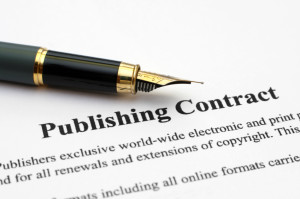 Keep a Positive Attitude
Keep a Positive Attitude
Editorial contacts have enormous potential, and if you are winsome, respectful, and willing to reasonably adjust your work to meet an editor’s standards, there is hope.
An editor who rejects your work may forward your proposal to another editor, just because she liked you.
Attitude is everything.
Go into every meeting convinced that someone will publish your work; maybe not the publisher you meet with, but someone.
Confidence—with humility, and a willingness to listen—go a long way.
 What Do You Think?
What Do You Think?
How did you find your publisher?
Interested in Sharing Your Wisdom on Uncommonplace Book? Email your post ideas to lizcovart[AT]mac[DOT]com.


